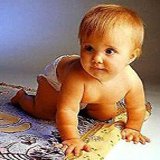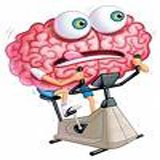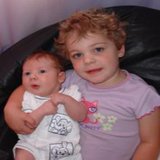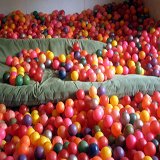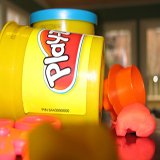Stages of Brain Development -
Skills & What to Do
I've received many questions from parents that wants to know what to do in the different stages of brain development and cognitive development in young children.
At birth, a baby's brain already has 100,000,000,000 cells. This is about the same number of stars in the Milky Way.
Stages of Brain Development
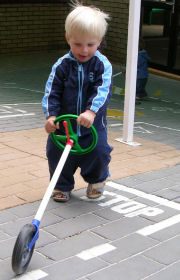
However, your child will go through different stages of cognitive development as he grows up.
Baby brain development occurs so fast that by age two a child who is developing normally has the same number of brain connections as an adult. By age three, a child has twice as many brain connections as an adult.
The different stages of brain development doesn't come to a complete halt by the time your child start school. Through brain gym exercises (like preschool learning games/preschool learning activities) and brain gym activities, kids will learn natural fundamental movement skills as they move through the different stages of brain development.
An interesting fact about the stages of brain development...
The human brain is not fully developed until late adolescence or in the case of males sometimes early adulthood.
We often expect cognition in children to be so advanced that we want our children to think like adults when they are not yet capable of doing so. It is important that parents know what to expect from their child as they go through the different stages of brain development and to be sure that the expectations they may have for their child at a given age are realistic.
The different stages of cognitive development in young children are broken down according to age for easy reference.
Stages of Brain Development: 15 - 18 months
| Skill | What to Do |
| Your child is able to combine his hand eye coordination, his concentration, his brain memory and his understanding in order to complete a complex task. | Seat your child in a high chair at a table or in his own child-sized chair and table. Build a tower with wooden bricks in front of him. Then give him some bricks and ask him to do the same. Depending on his mood, he might build a tower around three or four blocks high. |
| He can recall without much difficulty where certain objects have been placed in the house, particularly if he uses them regularly or if they are his favourite items. | Ask your toddler to bring you his teddy from his bedroom. He can probably remember exactly where it is - even though he can't describe the location in words - and is able to toddle off immediately so he can comply with your request. |
| His problem solving skills enable him to meet challenges that were previously beyond him, and he practices the solutions again and again. | Provide social play opportunities for her, either at a parent-and-toddler group or at a friend's house. Don't expect her to interact with her peers, however, because he doesn't know how to be sociable yet. |
Stages of Brain Development: 19 - 21 months
| Skill | What to Do |
| Wooden board games (inset boards) fascinate him and his type of toy is well within his capability, as a result of his developing reasoning and perceptual skills and his improved hand eye coordination. | Give your toddler a solid wooden inset board - in which the wooden pieces fit inside a frame - and watch him try to assemble it. he'll probably success as long as there are no more that about five pieces. If he has difficulty at first, show him how to solve the puzzle. |
| He is no longer curios only about events happening in his immediate environment. Now his interest has extended to occurrences beyond the walls of his house. | If your toddler hears noises outside, perhaps in the garden or in the street lift him up so that he can peer out of the window. You'll find he is completely engrossed by all that he sees. |
| Cupboards and closed spaces trigger his curiosity. He has a boundless desire to know what is concealed behind those closed doors and will go to great lengths to find out. | Provide opportunities for your inquisitive toddler to explore whenever possible. Keep a special cupboard of box full of "treasures" that he can safely investigate. However, he needs supervision. His lack of appreciation of danger means that if he finds a bottle of fluid, for example, his first reaction is to taste it. Have childproof locks on cupboards containing hazardous or breakable items. |
Stages of Brain Development: 22 - 24 months
| Skill | What to Do |
| He begins to understand that he can manipulate and arrange objects in order to achieve a desired result. However, his limited hand eye coordination may sometimes inhibit him. | Give your child a small plastic toy barrel that unscrews in the middle. Encourage him to watch as you open the barrel, put a small toy inside, then screw it together. Hand the barrel to your child and ask him to get the toy out of it. He'll try hard. |
| Imaginative play shows through at this imagination stage. He is able to create scenes and images in his head using imaginative play toys as props to act them out. | Improve imagination by allowing him to play with a doll's house with the little figures and furniture that go inside. He gives each tiny doll figure a name and moves furniture from room to room, as he gives this imagination stage his full concentration. Other toys such as toy vehicles and farms with miniature animals provide similar kids imagination opportunities. |
| Your child watches you closely while you progress through the day and he occasionally copies your actions. He may do this for several minutes at a time. | Sit on a chair facing the mirror, and start to brush your hair. Ask your child to sit beside you. After staring at you for a couple of seconds he'll begin to brush his own hair. Copying what you do is instinctive and makes him feel very important. |
Stages of Brain Development: 25 - 30 months
| Skill | What to Do |
| He is beginning to understand the concept of how kids can make money, although at this age this knowledge is still at a very elementary level. He hasn't yet grasped that each coin has an individual value. | Show him a handful of coins, and ask him to tell you what they are. He may be able to tell you that they are "money", but he won't be able to name any of the coins. Give him some realistic-looking plastic coins and notes to play shops with. |
| Although he may not be able to explain to you in words why certain objects should be grouped together, he has developed the concepts of classification. | Place a small bundle of plastic animals and plastic bricks in front of your child. Say to him, "Sort these out. Put one pile here and another pile here." It is likely that he is able to sort them into a pile of bricks and a pile of animals, without the need for further explanation. |
| Your child's broad sense of time begins to emerge. While an appreciation of hours and minutes is beyond him, he begins to understand larger units of time, such as days. | Tell him that you will take him to the park "tomorrow". The fact that he is excited at this promise and yet doesn't immediately rush to put his hat and coat on is confirmation that he knows the outing to the park is not now but in the future. You can encourage his appreciation of time by explaining future events in terms of familiar daily markers, saying "after breakfast", for example. |
Stages of Brain Development: 31 - 36 months
| Skill | What to Do |
| As his short- and long-term memories become more reliable he is able to recall and accurately discuss experiences that have occurred in the past. | Talk to your child about something that you both did yesterday - he'll remember. Then extend the conversation to something special that you did a couple of weeks ago (for instance, a visit to his grandparents). You'll probably find that his recall of that is also good. |
| Your child becomes more able to use his background knowledge and past experiences in order to anticipate the consequences of his actions, although he still acts impulsively. | Pose questions that encourage him to think ahead. For instance, "What would happen if you filled the glass to the top and tried to lift it?" or "Suppose you pushed that chair, what would happen next?" In most instances, he correctly anticipates the outcome of such events. |
| He is able to make basic comparisons between objects in terms of size or height. However, he still sometimes gets confused over this even by the time he reaches the age of 3. | Take two glasses of equal size from the cupboard. Pour juice into one glass until it is almost full and pour only a small amount into the other glass. Tell your child to "Show me the glass with the most juice in it". He'll probably select the right one. |
Benchmarks of baby brain development, though, are neither hard nor fast. The age range for some achievements can vary by months even years. And in some cases, even if a child falls outside the range of "normal," it's not necessarily cause for alarm.
Speed of development naturally varies; every child grows and adjusts to the world at his or her own pace, oblivious to the fact that the baby boy down the street, born three days later, is already regarding his own hand.
Human development is no race, even if we sometimes mistake it for one!!
Find It!
Can't remember where you read something specific? Just type in your search term in the box below and your specific topic will be returned to you instantly.





